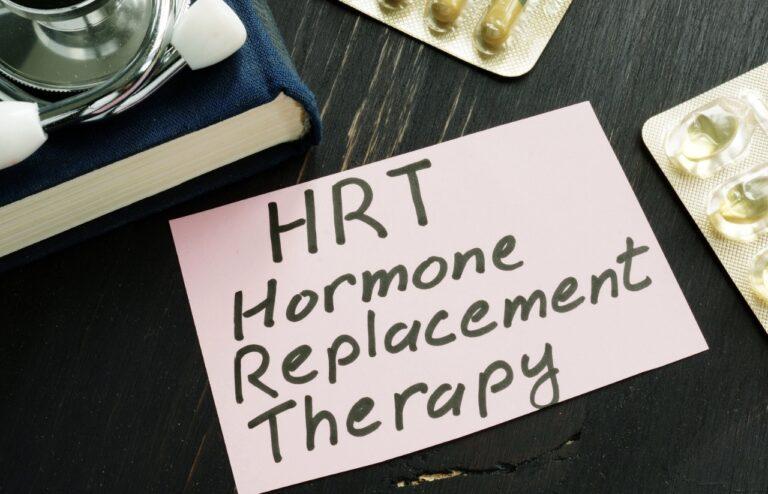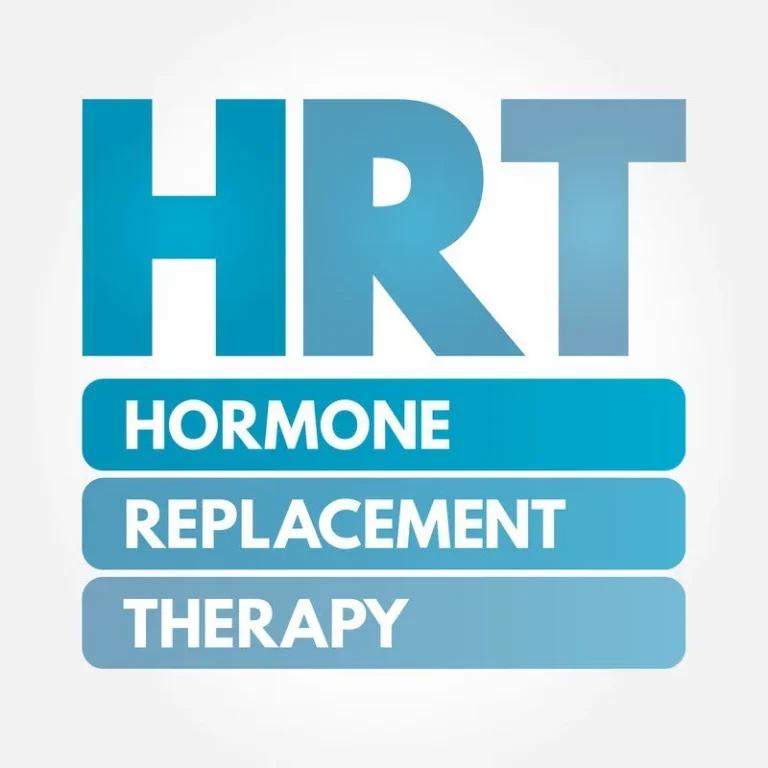

October 15, 2025 (Current Version)
March 28, 2025
Hormone replacement therapy (HRT) is a commonly prescribed treatment for menopausal symptoms and the prevention of postmenopausal bone loss. However, concerns about potential side effects, particularly weight gain, have left many women and healthcare providers searching for safe and effective alternatives. In this article, we will explore the effects of HRT on weight and body fat distribution, as well as the impact of lifestyle interventions on mitigating these effects.
Menopause
Menopause is the point in a woman’s life when her menstrual periods permanently cease. It results from the natural decline in reproductive hormones, particularly estrogen and progesterone levels. produced by the ovaries. The hormonal fluctuations associated with menopause can lead to a range of physical and emotional changes.
During menopause, women may experience symptoms such as hot flashes, hot flushes, night sweats, mood swings, vaginal dryness, sleep disturbances, and irregular periods. These symptoms of menopause can vary in intensity and duration, and their onset can differ from woman to woman.
Before reaching menopause, women go through a menopause transition phase called perimenopause. Perimenopause begins in a woman’s mid to late 40s and can last for several years before menopause is officially reached. During this time, hormone levels fluctuate, causing irregular periods and various symptoms.
Understanding menopause and weight gain
Before delving into the effects of HRT on weight, it’s crucial to understand the relationship between menopause and weight gain. During the menopausal transition, women often experience changes in their body composition, including an increase in abdominal fat and a decrease in lean muscle mass. These changes can contribute to weight gain and may also increase the risk of cardiovascular disease.
Examining the studies
Several studies have been conducted to evaluate the impact of HRT on weight and body fat distribution among perimenopausal and postmenopausal women. Let’s examine the findings of these studies to gain a comprehensive understanding of the topic.
Study 1: The WOMAN Study
In the Woman On the Move through Activity and Nutrition (WOMAN) study, researchers aimed to test whether a lifestyle intervention could reduce measures of subclinical cardiovascular disease (CVD) in postmenopausal women. The study included 240 women who were initially on HRT at baseline and were either continued (n=110) or discontinued (n=130) by 18 months.
The results of the WOMAN study showed that lifestyle modification was effective for CVD risk factor reduction in postmenopausal women. The lifestyle change group significantly decreased weight, BMI, waist circumference, total cholesterol, and LDL-C. They also improved fat intake and increased leisure physical activity, compared to the health education group. However, HRT discontinuation resulted in increased total cholesterol and LDL-C levels. These adverse effects were successfully attenuated by the lifestyle intervention incorporating weight loss, physical activity, and dietary modification.
Study 2: Metabolic effects of combined HRT
Another study examined the metabolic effects of combined hormone replacement therapy using 17 beta-oestradiol transdermic and oral medroxyprogesterone acetate. The study included 21 patients, 12 of whom were on HRT, and nine served as controls. The patients were studied twice, three months apart, during an oral glucose load.
The findings of this study revealed that combined HRT not only prevented weight gain but also favoured weight loss. The HRT group showed a significant decrease in body weight and a decrease in the waist-to-hip ratio. The study also observed an increase in lipid oxidation, total energy expenditure, and thermogenesis among the HRT group. The insulin response to an oral glucose load was diminished, and total and LDL-cholesterol levels improved after hormone replacement therapy.
Review: Hormone replacement therapy and weight
A comprehensive review of multiple studies on the topic examined the effects of hormone replacement therapy on weight and body fat distribution in perimenopausal and postmenopausal women. The review included 22 randomised controlled trials that fulfilled the inclusion criteria. The analysis of these trials found no statistically significant difference in mean weight gain between HRT users and non-HRT users, regardless of whether the HRT was unopposed estrogen or combined estrogen and progestogen therapy.
The review also analysed the effect of HRT on BMI and found no significant difference in BMI increase between HRT users and non-HRT users. However, due to insufficient data, the effects of HRT on waist-hip ratio, fat mass, and skinfold thickness could not be analysed.
The role of estrogen and progestogen in HRT
HRT typically involves the administration of estrogen and progestogen hormones. Each hormone can have different effects on the body, including potential side effects that may impact weight.
Side effects of estrogen
The most common side effects of estrogen (oestrogen) include headaches, breast pain or tenderness, unexpected vaginal bleeding or spotting, nausea, mood changes, leg cramps, mild rash or itching, diarrhoea, and hair loss. These side effects are usually temporary and tend to improve over time.
Side effects of progestogen
Progestogen, another hormone commonly used in HRT, can cause changes in menstrual periods, including spotting or bleeding between periods, headaches, breast pain or tenderness, nausea, diarrhoea, fatigue or dizziness, mood changes, mild rash or itchy skin, and acne. Like estrogen, these side effects are generally temporary and subside with continued use.
Side effects of combined HRT
If you are taking combined HRT, which includes both estrogen and progestogen, you may experience side effects associated with either hormone. The specific side effects will depend on the individual and the dosage of each hormone.
Side effects of tibolone
Tibolone is another type of hormone used in HRT. Common side effects of tibolone include breast tenderness, stomach or pelvic pain, unusual hair growth, vaginal discharge, itching or thrush, and vaginal bleeding.
Managing side effects of HRT
If you experience side effects from HRT, there are steps you can take to manage them. It is important to communicate with your healthcare provider about any symptoms you are experiencing, as they may be able to adjust your dosage or switch you to a different form of HRT.
In some cases, your healthcare provider may suggest changing your dose, the type of HRT you take, or the method of administration. For example, switching from tablets to patches may help alleviate certain side effects. It is crucial to speak to your healthcare provider if you have severe side effects or if they persist for more than three months.
Vaginal bleeding and HRT
Vaginal bleeding or spotting is a common side effect of HRT, particularly in the initial months of treatment. This is usually not a cause for concern and tends to resolve within six months. However, if you experience irregular vaginal bleeding for more than six months or if the bleeding becomes heavier, it is important to consult your healthcare provider.
For those taking sequential combined HRT or daily estrogen with separate progestogen tablets, withdrawal bleeding at the end of each progestogen course is normal. Continuous combined HRT may also cause irregular vaginal bleeding or spotting for the first four to six months. If irregular bleeding persists, your healthcare provider may adjust your progestogen dosage.
Weight management and HRT
Limited evidence suggests that most types of HRT lead to weight gain. Weight gain during menopause and as women age is a common occurrence, regardless of HRT use. However, it is important to note that individual experiences may vary.
Lifestyle changes, such as regular exercise and healthy eating are key factors in managing weight, whether or not you are on HRT. Engaging in physical activity and consuming a nutritious diet can help you maintain a healthy weight and reduce the risk of weight-related health issues.
The benefits and risks of HRT
While HRT can be beneficial for managing menopausal symptoms and preventing postmenopausal bone loss, it is important to consider the potential risks associated with this treatment. HRT has been associated with a small increase in the risk of blood clots and breast cancer.
It is crucial to have open and honest discussions with your healthcare provider to weigh the benefits and risks of HRT based on your health profile. Your healthcare provider can help you make an informed decision about whether HRT is the right option for you.
Conclusion
In conclusion, the relationship between HRT and weight gain is complex and varies among individuals. While some women may experience weight changes during HRT, studies have shown that HRT does not cause additional weight gain beyond what is typically observed during menopause. It is important to manage any side effects of HRT by working closely with your healthcare provider and adopting a healthy lifestyle that includes regular exercise and a balanced diet. By being proactive and monitoring your health, you can make informed decisions about HRT and ensure optimal well-being during the menopausal transition.
Sources
- Discontinuing Hormone Replacement Therapy: Attenuating the Effect on CVD Risk with Lifestyle Changes – PMC
- Beneficial effect of hormone replacement therapy on weight loss in obese menopausal women – PubMed
- Oestrogen and progestogen hormone replacement therapy for peri-menopausal and post-menopausal women: weight and body fat distribution – PubMed
- Side effects of hormone replacement therapy (HRT) – NHS
Medical Disclaimer
NowPatient has taken all reasonable steps to ensure that all material is factually accurate, complete, and current. However, the knowledge and experience of a qualified healthcare professional should always be sought after instead of using the information on this page. Before taking any drug, you should always speak to your doctor or another qualified healthcare provider.
The information provided here about medications is subject to change and is not meant to include all uses, precautions, warnings, directions, drug interactions, allergic reactions, or negative effects. The absence of warnings or other information for a particular medication does not imply that the medication or medication combination is appropriate for all patients or for all possible purposes.








